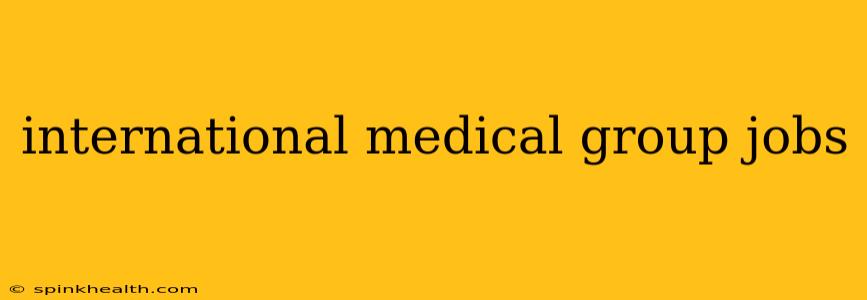The world is shrinking, and not just metaphorically. For medical professionals, the opportunity to work internationally has never been more accessible or appealing. The allure of diverse cultures, challenging medical scenarios, and the chance to make a real global impact draws many to seek international medical group jobs. But this exciting path presents unique challenges and considerations. This guide will illuminate the journey, answering your burning questions and helping you navigate this rewarding career path.
What are International Medical Groups?
International medical groups aren't a single entity; they're a diverse collection of organizations operating across borders. These groups can range from large multinational corporations providing healthcare services in multiple countries to smaller, specialized NGOs focusing on specific regions or diseases. Some are focused on providing care in underserved communities, while others offer high-end medical services in international clinics or hospitals. Understanding the different types is key to finding the right fit for your skills and aspirations.
What Kind of Roles are Available in International Medical Groups?
The possibilities are vast! International medical groups need a wide range of professionals, from doctors and nurses to administrative staff and researchers. Specific roles might include:
- Physicians: Specialists and general practitioners are consistently in demand, particularly in areas facing healthcare shortages.
- Nurses: Registered nurses, certified nurse midwives, and other nursing professionals are essential in international settings.
- Medical Technicians: Radiology technicians, laboratory technicians, and other allied health professionals play crucial roles.
- Public Health Professionals: Epidemiologists, health educators, and program managers are vital for addressing global health challenges.
- Administrative and Support Staff: These individuals are the backbone of any successful medical operation, including roles in finance, human resources, and logistics.
What are the Requirements for International Medical Group Jobs?
The requirements vary depending on the specific role and organization. However, some common elements include:
- Medical License and Certifications: You'll need valid medical licenses and certifications recognized by the country where you'll be working.
- Experience: Prior experience in a relevant field is often crucial, with the level of experience required dependent on the seniority of the role.
- Language Proficiency: Fluency in English is typically essential, and additional language skills are highly valued, especially those spoken in the target region.
- Cultural Sensitivity and Adaptability: The ability to work effectively in diverse cultural settings is paramount.
How Do I Find International Medical Group Jobs?
The hunt for international opportunities requires a strategic approach:
- Online Job Boards: Websites specializing in international jobs are excellent starting points.
- Networking: Attend medical conferences, join relevant professional organizations, and connect with people working in international healthcare.
- Direct Applications: Research organizations that interest you and apply directly through their websites.
- Recruitment Agencies: Specialized recruitment agencies can connect you with suitable opportunities.
What are the Benefits of Working for an International Medical Group?
Beyond the obvious professional satisfaction, working for an international medical group offers:
- Career Advancement: Gaining experience in a global setting can significantly boost your career trajectory.
- Personal Growth: Exposure to diverse cultures and challenging environments fosters personal growth and resilience.
- Making a Difference: You'll have the opportunity to contribute to global health initiatives and improve the lives of others.
- Travel and Exploration: You'll get to experience new countries and cultures firsthand.
What are the Challenges of Working for an International Medical Group?
It’s not all sunshine and rainbows. Be prepared for:
- Cultural Adjustment: Adapting to a new culture can be challenging, requiring patience and understanding.
- Logistical Hurdles: Securing visas, finding accommodation, and managing finances in a foreign country can be complex.
- Language Barriers: Communication difficulties can arise even with language proficiency.
- Working in Challenging Environments: You might encounter limited resources or difficult working conditions.
How Can I Prepare Myself for an International Medical Group Job?
Preparation is key to a successful transition:
- Develop Relevant Skills: Enhance your skills through further education or training.
- Gain International Experience: Seek opportunities for international volunteering or short-term assignments.
- Improve Language Skills: Become proficient in the languages spoken in your target regions.
- Research the Cultural Norms: Familiarize yourself with the customs and traditions of the countries where you plan to work.
Embarking on a career with an international medical group is a significant undertaking, but the rewards—both personal and professional—can be immense. With careful planning, preparation, and a spirit of adventure, you can find a fulfilling and impactful role in this dynamic field.

